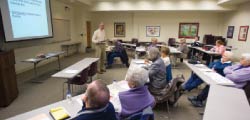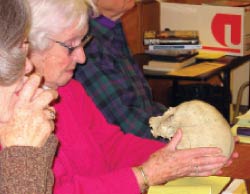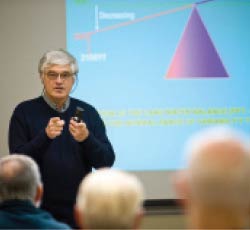Learning Later
Program at UM offers adult education for those fifty and older
By Sharon Barrett


TOP: MOLLI courses are taught by distinguished UM faculty, including former UM President James Koch. BOTTOM: MOLLI students have the opportunity to study skeletal remains in an anthropology course taught by UM Lecturer Garry Kerr.
The Osher Lifelong Learning Institute at UM, a successful new program at the University, has given a whole new meaning to the notion “Adults Only.”
Anyone fifty years and older can become a member of the institute, commonly known as MOLLI, for just $20 a year. Then, for $60 a course, these adults can choose from an array of classes offered every fall, winter, and spring. Courses are taught by top-ranked faculty and have no homework and no exams.
At first glance there is nothing extreme about any of that. Except maybe the rock-bottom price of admission to courses such as Global Warming, team-taught by Steve Running—who shared in a Nobel Peace Prize for his research on climate change—and Dane Scott, director of UM’s Center for Ethics.
Or History and Literature of WWII, another course team-taught by former UM and Old Dominion University President James Koch and his wife, Donna, whose credentials in writing and teaching take up half a page in MOLLI’s class registration booklet.
Or The Next President and the Middle East, taught by Mark Johnson, whose resume includes serving as U.S. ambassador to Senegal and postings in Egypt, Iran, and Kuwait.
No wonder MOLLI’s fall 2008 classes—in only the third year of the program—enrolled a record 641 students. No wonder MOLLI already has received $300,000 from the Osher Foundation and, because of its burgeoning enrollment, could receive $1 million in March 2009. It stands a likely chance of yet another $1 million the following year as long as enrollment continues to grow.
Meanwhile, students’ enthusiasm for MOLLI is overwhelming. Member Jean Bowman’s experience with the program is typical of other MOLLI students. A UM alum with degrees in political science in ’82 and law in ’85, Bowman completed her fourth MOLLI course this fall. So far she’s learned about China, Iraq, constitutional law, and freelance writing. She first heard about MOLLI through a brochure the program mailed her. And now she’s one of the many satisfied MOLLI members who recommend it to others. Word of mouth has become MOLLI’s best marketing tool.
Bowman, like many other MOLLI students, enjoys the program because it gives her “the chance to meet people I would otherwise not know.” She also likes MOLLI for the opportunities it gives to people who have “never lost the love of learning and now have time to learn something unrelated to their profession.”
EYE IN THE SKY

Regents Professor Steve Running offers a course on climate change.
The idea for MOLLI was born around Christmas 2004, when UM President George Dennison was on an airplane, reading the in-flight magazine. An article about a lifelong learning institute at a university in Utah caught his eye. Dennison kept the article and sent it to UM Continuing Education Dean Sharon Alexander with a note reading, “Why don’t we have one of these?”
Alexander, not one to let any grass grow under her feet, started acting on the president’s request. First, she learned all she could about the Bernard Osher Foundation, which would become the main source of money for UM’s project.
Then she recruited prominent local citizens to help with the project: Tom Huff and Rustem Medora, longtime UM faculty; Sue Talbot, a well-known supporter of the arts, conservation, and youth homes; Daniel Kemmis, former state legislator and Missoula mayor; Herbert Swick, a physician, who at the time was director of the Institute of Medicine & Humanities, a program of St. Patrick Hospital and Health Sciences Center and UM; and Ann Boone, an energetic supporter of many community and University activities.
By fall 2005, Continuing Education hosted an open house at the University Center for people aged fifty-five and older and asked them for ideas. (Until fall 2008, the age requirement for UM’s institute was fifty-five. It is now fifty.) The department also offered what Alexander calls two “appetizer courses” taught by Mehrdad Kia, UM’s associate provost in charge of international programs, and Rafael Chacón, UM art history and art criticism professor.
GOING AND GROWING
In January 2006, barely a year after President Dennison’s “Why don’t we have one of these?” question, the answer was simply, “We do.” Wintersession and spring semester courses combined attracted 180 students. And that enthusiasm prompted the Bernard Osher Foundation—which Alexander had been courting—to offer financial help.
The Osher Foundation, headquartered in San Francisco and a longtime supporter of education, had begun turning its attention to programs for mature students. According to the foundation’s Web site, older students are “not necessarily well served by the standard continuing education curriculum.” Those courses, says the foundation, attract students of all ages whose goals are to complete degrees or to upgrade career skills. “By contrast, the interest of more senior students, many of whom are at retirement age, is in learning for the joy of learning—without homework or examinations,” the site says.
Alexander found joy in learning about the $300,000 that Osher would grant UM to keep its lifelong learning institute going and growing. The money would come in $100,000 installments—the first in August 2006, the next in August 2007, and the final in August 2008.
Osher didn’t stop there. If MOLLI could enroll a total of 500 members by the end of those three years, it would be eligible to apply for a $1 million endowment from Osher. “The money,” says Alexander, “would be in endowment funds to the UM Foundation to subsidize subsequent years of operation.
“The very good news,” she says, is that MOLLI currently has 735 members, which may result in the receipt of $1 million in March 2009. Even better news is that if MOLLI can reach 1,000 members by the end of its granting period, December 2009, it will be eligible to apply for another $1 million endowment in January 2010.
The Osher Foundation presently supports lifelong learning institutes on university and college campuses in forty-nine states and the District of Columbia. All of these institutes (122 at last count) require membership. Fees vary, but UM’s, at $20 a year and $60 per course, are “pretty standard,” Alexander says.
Osher funding comes with a couple of strings attached. One is that membership age must be fifty and over. UM’s institute had to adjust downward last fall because it had begun with a minimum age of fifty-five. Also, Osher requires that all its institutes follow this pattern: Osher Lifelong Learning Institute at the University of X. So, technically MOLLI is the Osher Lifelong Learning Institute at UM, but the University has been permitted to keep as an informal acronym—the one it’s had since Alexander first heeded Dennison’s request: MOLLI.
And a third string is that MOLLI must offer “a diverse repertoire of intellectually stimulating courses.”
None of those conditions is difficult to comply with. “We have the best faculty,” says Alexander, noting that the “intellectually stimulating courses” offered by MOLLI come from both active and retired UM faculty, as well as from community members who are experts in certain fields.
“In my view,” says President Dennison, “MOLLI has done remarkably well during the initial period. All of this has become possible because of the huge public interest in lifelong learning in the surrounding communities and the aggressive effort to deliver programs.”
In addition to the financial boost MOLLI brings to UM, there are other rewards. Both Alexander and Dennison agree that MOLLI is a great way to expand relations between the University and the community.
“The benefits to The University of Montana,” says Dennison, “include tangible ones having to do with the involvement of more and more people from the surrounding communities in the programs the University offers. Involvement generates greater awareness of the possible contributions the University can make, as well as an understanding of our efforts to respond. Remaining responsive will require that we pay more attention to needs in the area, requiring much more interaction with clientele groups to see what interests them and what they need.
“I have always believed,” Dennison says, “that getting more Montanans involved with the excellent faculty we have makes a huge difference, and the experience so far with MOLLI supports that belief.”
Alexander echoes that sentiment. “MOLLI brings people from the community who would never have set foot on the campus, and they’re coming here in huge numbers.”
For registration information, call 406-243-2905 or visit the MOLLI Web site at www.umt.edu/ce/plus50.
![]() Sharon Barrett, professor emeritus of UM’s School of Journalism, has taught two MOLLI courses and loved them.
Sharon Barrett, professor emeritus of UM’s School of Journalism, has taught two MOLLI courses and loved them.